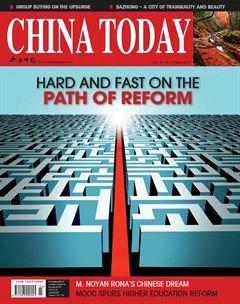Are You Ready to Perform?
By+ROBERT+PARKINSON
HEARING the keyword“performance,” you might think about your favorite drama show, TV series, or key performance index. But our topic today is a different type of performance. Here, what I mean is how you perform in interviews with Chinese HR professionals. Having advised you how to prepare for the pre-interviews in the last article, this time I will go through the interview process to give you more practical tips. Hopefully, you will find them useful when you take to the interview“stage.”
First things first, I have always believed that nonverbal communication issues are important in the interview process, not because HR professionals will judge you based on your looks and deportment, of course, but things like eye contact and facial expression reveal a lot about what is on your mind. These are things that many interviewees cannot prepare beforehand. However, they are the key to good communication in the interview.
One of the ways to facilitate the communication process with HR professionals is to maintain regular eye contact. Imagine if you were to gaze dreamily outside the window or stare intensely at the interviewer as if he were your enemy– wouldnt it give the interviewer the impression that there is something wrong with you? Fleeting eye contact indicates that the interviewee is not really interested in the conversation. But persistent staring indicates that the interviewee might be over-aggressive. While I have heard of Steve Jobs classic method of looking intently at prospective employees, I dont think its a good idea for expat interviewees to adopt this method. A good suggestion is to look at someone “between the ears”and maintain consistent but not constant eye contact.
The second point is about building rapport, which is defined as the good relationship between two parties. To start the process of rapport building, smiling matters, characteristics matter, body language matters, and so on. Every interviewer welcomes a friendly smile, especially during a long interview. If you were to talk without any emotional responses for an hour, wouldnt you wish the tedious conversation to be over and done with as soon as possible? If you are serious throughout your interview, you will not build a smooth and comfortable interview environment. Additionally, people who copy the body language of others tend to build a close connection with them. This principle is called mirror and matching and it indicates the importance of unconscious communication. As you find yourself sitting in the same position as the HR professional, your unconscious mind might send you signals that you like this interviewer. So, if you want to build a good rapport, why not try to mirror and match the interviewers body language.
Another point I would like to make is about verbal language. Language really matters on both sides. A classic scenario would be a native English speaker going to an interview with a Chinese HR manager whose English is not that good. If this happens to be you, I suggest you do not laugh it off. Spotting a potential weakness in a Chinese HR professional, some foreign interviewees might be tempted to use it against them and talk quite aggressively. However, will “attacking” the language problems facilitate the interview process? Here, I would like to remind every expat interviewee that you are the one who is being interviewed. If you hope to find the best opportunity in the job market, you will have to present yourself in a positive and polite way. In this regard, slowing down the speed of your speech, pausing appropriately, speaking in the right tone, and giving specific and clear answers might help both you and the interviewer avoid a potentially embarrassing situation. Additionally, I would like to suggest the interviewee help the interviewer with the conversation. When someone is nervous during the interview process, the result normally turns out to be negative. Therefore, helping the interviewer dispel any nerves will do the interviewee a favor at the same time.
Have you ever experienced a cold interviewer? You talk with him or her quite actively, but he or she seldom gives you any responses or affirmative feedback. In this case, the last tip for expat interviewees would be not to be put off by the HR persons apparent distance. Not every HR professional is trained to be active and talkative. Actually, a stand-offish manner is often a technical skill used by some senior HR professionals. If the expat interviewee is going through the interview process quite smoothly, the interviewer has to challenge him or her to see his or her reaction. By analyzing verbal responses and changes in facial expressions, the HR personnel can get a full image of your characteristics and personality at work.
As I mentioned in the previous article, it is advisable to prepare for an interview beforehand. However, that is still far from giving a good performance on the actual day. Therefore, after sharing some tips you may not have thought of before, I look forward to hearing many more interview success stories!

